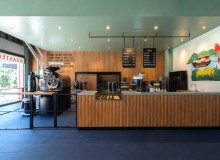
April 12, 2013
808 State
The seminal electronic act reveals a political side to rave culture
By Metropolis
Originally published on metropolis.co.jp on April 2013

New Order veteran, Madchester maverick and indefatigable impresario Peter Hook’s travelling Hacienda festival returns to the Prince Hotel’s Oiso digs on the beach south of Yokohama. Ahead of the weekend poolside party, Metropolis caught up with two of the headliners, who collectively represent two generations of electronic dance music. First up is Manchester’s 808 State, one of the defining acts of the late ’80s acid house scene.
Movies have been made and books written about legendary Manchester club The Hacienda and the dance-music revolution that swirled around it. If any one track can be said to encapsulate the electronic side of the northern English city’s creative ferment in the 1980s, high on the list would be 808 State’s “Pacific State.” Created by the trio of Graham Massey, Martin Price and Gerald Simpson, the song’s contrast of coldly mechanical drums with warm synth and sax lines set the template for many an acid-house anthem to come.
“The best memory for me is having it played as the last tune of the night at the Hacienda at the height of the madness,” Massey recalls ahead of his set at the upcoming Hacienda Oiso Festival south of Tokyo. “It felt like scoring a goal at a cup final. I have not become bored playing that tune.”
Massey says the unique confluence of musical influences in Manchester at the time provided the basis for a legacy that continues to shape pop music a generation later. “As a teenager we would go to rock discos in Manchester, they played quite a mix of music… Led Zeppelin next to David Bowie, Gong next to Kraftwerk. Reggae, prog, soul and punk all mixed together at times. The music culture in Manchester was diverse—much like its population.”
The Hacienda—chronicled in the film 24 Hour Party People—is remembered for an adventurous approach that arced from the austere ’80s postpunk of New Order to the ’90s hedonism of the Happy Mondays—but Massey fills out a richer picture, informed by the sociopolitical currents of the era.
“The ’80s were a time of disempowerment for young people in Manchester,” he notes. “There was a divide in the UK. On the one hand some people were riding a wave of affluence in London, [on the other] the politics of Prime Minister Margret Thatcher was not at all popular in Manchester. There was an anti-establishment atmosphere that fueled the new nightclub and music scene—a ‘do it yourself’ culture arose out of a need for expression.”
Massey provides a perspective at odds with the image of narcissistic euphoria seeking with which rave culture has often been written off. “Martin was inspiring in his determination for change,” he says of his 808 partner, who ran key Manchester record shop Eastern Bloc, around which the group formed in 1987.
“He saw the dance-music revolution as a political thing, therefore it was important to draw the dividing lines from the old culture to the new. Guitar bands were out. Using the new technology was a stance for change, being armed with a sampler was very much about starting a new page. We had more in common with Detroit than London. Joining an internationalism of the dance floor was a rejection of colloquialism that had chained us.”
So where are the politics of today’s so-called EDM scene? “30 years ago, all the music seemed fresh and unpredictable. I’m aware of equivalent illegal raves that go off around Manchester in the present,” Massey observes. “I think the spirit of anti-establishment partying is building in the UK. Let us hope austerity will result in as much creativity this time around.”
Massey will bring to Tokyo the same five-member iteration of 808 State—named for the Japanese-made Roland sequencer that powered the acid house scene—that electronic music heads witnessed at Daikanyama’s Unit in 2011. “We’ll play our better-known tunes, but we always like to throw in a few obscure tunes from the back catalogue,” he says about the upcoming Hacienda-branded festival, which will feature fellow Hacienda vets the Happy Mondays along with a slew of younger EDM artists like Delphic and Digitalism.
25 years since founding 808 State, Massey’s fervor remains undimmed. “I think the need for music has not changed so much since it began: communion transcendence, celebration, addressing death,” he affirms. “We are on a rock in a dark place, we are curious creatures who play with our surroundings, and we make out patterns where there seems chaos. If there is a dark hole what do you do first? Shout into it!”







